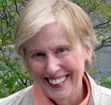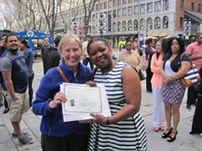
Executive Director
Cynthia is board certified in internal medicine and was a primary care doctor for many years before starting Adult Foster Care North Shore in 2001.
The Director's Corner
May Director's Corner
On Being an Immigrant: Winnie Thuo RN

The first time Winnie Thuo saw snow was in London when she was 20 years old. She looked out the window of her dormitory in the morning, and everything was white. She had to walk to class, and no one had told her that she needed different clothes and boots. By the time she got to class, her sneakers and socks were soaked through, and her feet were wrinkled. She couldn't concentrate all day. After school she bought a pair of Timberline boots. They cost 50 pounds, but, even though she had very little money, she didn't care.
Winnie was born and raised on a farm in Kiambu, Kenya in Africa. Her parents sent WInnie and and her three brothers to a school where they were taught British English starting in kindergarten. After high school Winnie went to England to study hotel management and culinary arts. She was accepted for an internship at the Boston Copley Hotel and arrived in the United States in 1997.
The first thing she remembers is how big ("and I mean BIG") and different everything was. The roads were huge, people drove on the wrong side of the road, the steering wheel was on the wrong side of the car, and the food was a lot. "They gave you enough for 6 people. Who eats like that?"
One day she was driving on Route 114 in Danvers and saw a sign for Brooksby Village. She drove in and thought it was the most beautiful place ever. She went to the office, and the lady who greeted her was holding a piece of paper. Winnie asked if there were any jobs for something like a nurses' aide, and the lady said yes, right here and showed Winnie the paper. Winnie was hired on the spot. She worked there for five years.
She applied for nursing school and was accepted. She did not have the money for school, and her boss told her that Brooksby had a new program called GAIN (Growing Associates in Nursing) that would help. Brooksby would pay for 100% of tuition, books and uniforms if WInnie would keep at least a "C" average, continue to work 16 hours per week (for pay), and agree to work as a nurse for two years after school. Winnie did not hesitate. She accepted the offer immediately and was the first person to complete the GAIN program.
Since 2010 Winnie has returned to Kenya to visit. "It was the most amazing experience ever... priceless... I cried," she said. After almost 15 years away, she found that things in Kenya seemed so small. The roads were small and dusty. There was too much population. And there seemed to be no sense of order and time. People drove haphazardly. You couldn't tell if someone was going right or left. And everyone was very, very happy.
The concept of time in Kenya was completely different. If someone said they would meet you at 2:00, he might show up hours later and think nothing of it. a routine trip to the bank might take all day while you waited for the teller to have tea and then a long lunch. And people didn't mind. No worries... hakuna matata.
Winnie officially became a U.S. citizen on April 16, 2015 at a ceremony in Boston. Her advice to others? "The United States has what it takes, but it is not handed to you. You have to have goals and execute those goals. If you think the government is going to hand you food and housing and money, you're right, they will. But it is conditional. The U.S. is the worst country to be poor in. The best thing you can do is get an education and learn to express yourself. If you get an education and speak the language, doors will open."
Winnie says, it sure feels nice to be a citizen of this great nation. April 16th 2015 goes down in my history as one of my most significant days in the USA.
April Director's Corner
Perkins Library
Perkins School for the Blind provides a free library service for people who have trouble reading. This service is not only for people who are blindbut also for those who have trouble reading for whatever reason. A person may qualify with a physical condition resulting in difficulty holding a book or a learning disability such as dyslexia or developmental delay.
The most popular service is "talking books." The library also has newspapers, movies, and magazines.
In order to apply, call them at 800-852-3133 or go online to www.perkinslibrary.org . Your application must be signed by a professional (e.g. doctor, nurse, social worker, occupational therapist) verifying your condition.
Once you are accepted as a "patron", you will receive a simple playback machine in the mail. Then you choose books. Books are available as "talking books," large print books and also Braille books. Everything is free. Book titles and topics are in a catalogue and also online. Also a "Talking Book Topics" is mailed out every other month with information about new books.
The Library has more than 1000 movies that are "audio described." This feature is a separate voice describing the on-screen action during the movie.
Books and movies are mailed out in plastic mailers that require no postage to send back.
You may also subscribe to a magazine. The Library has more than 100 available. The magazines are read out loud. And there is a "Newsline" with which you may listen to a newspaper being read to you. The Library has more than 350 newspapers available for patrons. I can't imagine listening to the entire Boston Globe every day, but that's me.
If you are interested in becoming a Perkins patron, we can help you. Ask your visiting AFC team to get you an application.
March Director's Corner
On Being an Immigrant: Bomi Cozzens RN
Bomi Cozzens was 14 when she first visited the United States. It was during summer break from school. She and her parents took a direct 14 hour flight from their native Seoul, South Korea. She remembers how "big" everything seemed... all the pretty houses with lawns. Everything seemed different. The languages and different races fascinated her. She remembers from her childhood that she had always been curious about what other kids around the world were doing that was different from her.
When the family returned to Korea, Bomi wished she could study in the U.S. "I was very blessed that my parents were able to support my decision," she said.
Three years later, she started 10th grade in a private school in California. She lived in a dormitory with other international students. The study of English grammar was required in Korea, but she still had a hard time with spoken English, and, except for math, she had trouble with her classes. Bomi describes herself as shy and introverted. The situation was lonely and depressing.
The following year, she transferred to a school in Anchorage, Alaska, where her brother was studying. Gradually she was able to understand more English. She later went to Christian University in Virginia and studied public health and theology. There, she met her future husband, Jonathon.
Bomi eventually got her Registered Nurse degree and started working as a med-surge nurse in a hospital. She joined Adult Foster Care of the North Shore in 2013. In her work doing home visits, she meets lots of immigrant families and notes that they often carry their culture with them. Often first generation immigrants rely on their children to translate and deal with the outside world. "It's like they are from another village," she said. Bomi now lives with her husband and 18 month old daughter in Haverhill. Bomi's mother lives nearby and relies on them for just such things.
In 2013, Bomi became a U.S. citizen. She left the hospital against medical advice the day after giving birth in order to attend the ceremony. "Becoming a citizen, it felt like truly being free in this country! I am not bound by any immigration restrictions and documents anymore," she said.